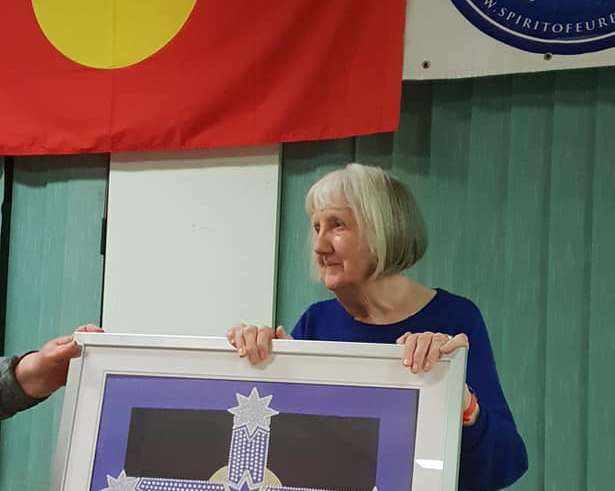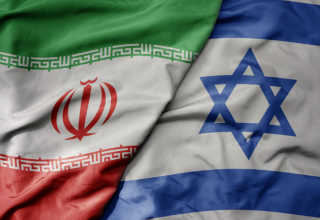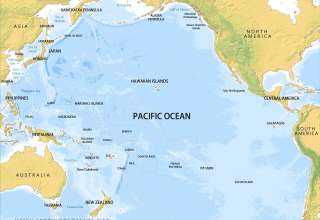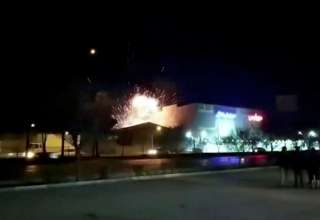We share below Joan Coxsedge’s address at the recent 165th Eureka Rebellion Anniversary Event in Melbourne. Joan was awarded the 2019 Spirit of Eureka Award for her tireless and unwavering dedication and work over more than 50 years for social justice, real democratic rights for the people and against imperialism and imperialist wars. We also share Spirit of Eureka’s presentation address of the award to Joan, which contains some things that about Joan’s life as an activist that she didn’t touch on in her speech.
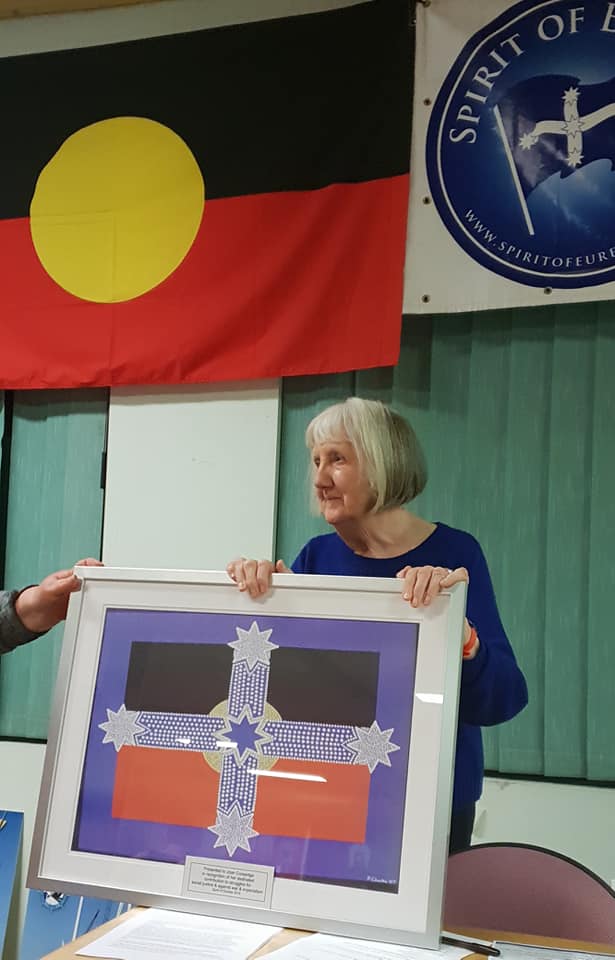 “Eureka Stockade Celebration” – Joan Coxsedge, 28 November 2019
“Eureka Stockade Celebration” – Joan Coxsedge, 28 November 2019
I’d like to start with the story of two brothers who were involved in the Eureka Stockade.
One was my great-grandfather, Dan Hogan. Dan was born in Liverpool and in 1848 at age 16 was apprenticed into the Merchant Navy, joining the crew of the Mary Rae which sailed around the world. He later joined the Royal Navy and served on the sloop Fantome which took part in the Crimean War. The ship eventually sailed into Australian waters and in 1854 was moored in Port Phillip Bay when the Eureka Stockade erupted, triggered by the imposition of thirty shillings a month tax on the gold miners. Able Seaman Hogan was one of the naval contingent ordered to march to Ballarat to ‘quell the trouble’.
On the opposite side of the conflict was his bother, Jeremiah Hogan, my great uncle, who was born in Killarney in 1826. Jeremiah arrived in Australia in 1852 and was a miner at the Eureka Stockade. He was arrested and later released without charge, and spent the rest of his life in Ballarat, working as a tailor.
To complete the connection, I was born in Ballarat because my father worked in the railways. But we didn’t stay long because the winters were too cold my mother said, so we returned home to Kensington, very working class back then. This was at the height of the Great Depression, a terrible time when unemployment peaked at over 35% with another third on ‘short-time’ when work was rationed to one week in three and wages were slashed.
I was at primary school in 1937 when a severe polio epidemic – then called infantile paralysis – swept the state. Picture theatres and schools were closed and lessons arrived by mail, with Victoria virtually quarantined from the rest of the country. And then there was Black Friday, 13 January 1939, another date I’ll never forget. Streams and dams dried up and water was rationed, even in Melbourne. The temperature hovered for over 100 degrees for the entire week, but on that particular day, the mercury shot up to more than 114 degrees with humidity below 10 per cent accompanied by a stinking hot north wind, a diabolical combination. On that terrible day, separate fires that had been burning for days joined up into one ferocious holocaust of flame. Pieces of bark and ash covered our streets and the sun was blotted out under a cloud of dense smoke. Scores of people died and entire townships were burned to a crisp. At its most intense the fire burned the earth itself.
Nine months later, In September 1939, Australia was once again at war, when we had rationing, blackouts and air raid shelters in our school grounds and I had a brother in the RAAF and an uncle who was one of the ‘Rats of Tobruk’. The fear was palpable that we were about to be invaded by the Japanese. Instead, we were invaded by the Americans with power-hungry warrior General Douglas MacArthur at the helm, 30,000 of them who used us as a base after the US fleet was bombed at Pearl Harbour. They were stationed around our city and took over many of our institutions and many of our young women.
At war’s end, we saw films of concentration camps and US atom bombs dropped on Hiroshima and Nagasaki, when the Japanese were already trying to surrender, but this was intended as a message to the Soviets, the first shot in Washington’s Cold War.
After the war, Britain was broke and Pax Britannia was replaced with the Truman Doctrine and we grovelled along with our new American masters. In the following years I lost track of all the military incursions, takeovers and coups that took place against nations that upset the Yankees, like Cuba, Chile, nearly all of Latin America, and Iraq, Libya and Syria, and so on. Since it was founded in 1776, the US has been at war for 214 out of its 235 years of existence, with only 21 years during that time when it wasn’t waging war against someone or other.
In 1953, I married Cedric and we had three kids, and then along came Vietnam which catapulted me into the anti-war movement like thousands of others around the world horrified at what we were seeing on our TV screens, the monks setting fire to themselves, napalm raining down on defenceless human beings, and defoliants destroying crops, killing the earth itself. This was before correspondents were embedded with the military and could report what they saw. Not like today.
But individuals aren’t worth two bob when confronting governments and war machines. Unions know that. So I put my art on hold and in the spirit of Eureka joined the anti-war and anti-conscription movement. I really hated meetings but ended up being swamped in the damn things. I was a founding member of the broad Moratorium movement and a member of Save Our Sons.
We held rallies and protests and took part in all sorts of actions, some legal and some decidedly not, and some of us went to gaol. As my husband said: he’d married what he thought was a reasonably conventional wife and mother and ended up with a gaol bird. But we were full of optimism and good humour because we believed we could not only stop the war but change the world. And we always had the support of trade unions.
One thing led to another. A few of us noticed that at every anti-war meeting or rally there were men taking notes and photos who followed us around, and we wanted to know who the hell they were and made it our business to find out. And learned there was a variety of snoopers in our midst. There was Special Branch, ASIO, ASIS and other outfits like the Commonwealth cops. And we didn’t reckon they belonged in a so-called democratic society and so a few of us started the Committee for the Abolition of Political Police, CAPP, to play them at their own game.
Using unconventional means, we found out who they were and where they lived, and put out lists of their names and addresses and distributed them far and wide, including letter boxing their streets. The snoops hated our guts but could only ring us up and issue threats, because what we did was legal back then. We put out loads of material to tell people what was happening, booklets, leaflets, letters and a book ‘Rooted in Secrecy’, which was published almost 40 years ago, except no publisher would touch it with a barge pole. No choice but to scrounge around and publish it ourselves. But what we wrote back then still rings true and if we did now what we did back then, we’d end up in Guantanamo Bay in orange jump suits. Ken and Gerry are dead but I’m still here. And they have long memories.
But it gave us insights into how our society worked. When Chile was done over by the CIA in 1973, we could see parallels happening with the newly-elected Whitlam government, a government the Yankees didn’t like at all, because Whitlam had elements of independence. He pulled us out of the Vietnam War, stopped conscription and released draft resisters from gaol, started Medibank, abolished university fees, established legal aid and a lot more. He upset our American friends even more when he demanded a list of all CIA agents operating in this country.
Among his other crimes was the ‘Loans Affair’ when Minister Connor tried to ‘buy back the farm’, to get back our foreign-owned resources to where they belonged, right here in Australia. His methods were clunky, but what he tried to do was right. And then, of course, there was Pine Gap, the CIA’s most valuable overseas base that sits near Alice Springs. The Pine Gap Treaty signed on 9 December 1966, stated that after 9 years, either party could terminate the lease on one year’s notice.
On December 9 1975, Whitlam could have acted, but he didn’t get the chance. When Parliament returned on November 11, he was sacked by Governor-General Kerr, a nasty drunk with impeccable CIA connections, leaving so many unanswered questions. Why didn’t Whitlam do his homework before appointing this creep? And why do academics write about the dismissal as if it was a home-grown plot when there is abundant evidence of CIA involvement? And why did Bob Hawke tell us to ‘cool it’ when we should have taken to the streets and stayed there.
Key players in the ALP learned their lesson well. Whitlam clammed up and the far-right NSW machine took over the party, ruthlessly eliminated progressive elements and turned corruption into an art form.
It’s been a downhill run since then. Once egalitarian Australia which led the world in workers’ rights and votes for women, now resembles the US, where 1% own the place, 20% are doing relatively OK because they work for the 1%, and 80% are hanging on by their fingernails. Counted as full-time even if you only work for a few hours a week, with no sick leave, holiday pay, security or other basics unions fought so hard for, you can suddenly land on the scrap heap and have to fight like buggery to get a lousy payout.
The corporates love our system because they can screw workers into the ground if they can get away with it, and they are getting away with it, because we’re at the mercy of the ‘free market’ to be plundered and looted, where costs continue to go through the roof and maintenance and services go down the plughole. And when we run into trouble, we’re foisted on to a foreign call centre. So it’s hardly surprising that just about everyone you meet is fed up to the back teeth at the lack of accountability, at the rorts and the way the rorters get away with their rorting.
And here we are again surrounded by Christmas crap and messages of good will, but not for those at the bottom of the heap. Infuriating when you see what Australia’s top ten corporate thieves are getting as they cream off the system, about 270 times the amount an average full-time Aussie worker earns. An as for those on Newstart and the pension…
Leading the pack is Qantas chief Alan Joyce who pocketed a staggering $23,876,351 million last year. A half-head behind him is Macquarie Group CEO Nicholas Moore with $23 million, 860 thousand in his annual kick. And then there’s the bonuses and the kick-backs. For what? Sacking workers to increase the bottom line? To describe them as having a sense of entitlement doesn’t even come close. It’s like calling Adolf Hitler a naughty boy. And I haven’t even mentioned the banks. Never have we needed a stronger trade union movement than we do now. Instead they’re about to be belted over the head with more appalling fascist-style legislation.
Our shrunken media, one of the most narrowly-based in the western world has got even more shrunken when Nine Entertainment took over Fairfax, with Murdoch’s malign influence still hovering. Dissent, once tolerated, has gone. America’s most celebrated journalist, Seymour Hersh, can only get published in Germany and John Pilger who used to appear in The Guardian was purged a few years ago. Our ABC used to provide an alternative, but very little now. Its budget’s been cut again, so I suppose its journos have to toe the official line, but if they must interview government ministers, they should demand answers to their questions when many interviewers don’t seem to know what questions to ask in the first place.
They’ve certainly thrown Julian Assange under a bus, when WikiLeaks did the job all journalists should be doing, to expose offical lies and corruption. The ABC and the Age reported that Sweden had dropped its rape allegations against Assange because of the time factor’, which is total bullshit because Sweden has only ever been a stalking horse for the US government.
The charges against Julian have nothing to do with Sweden or sex or the 2016 US election, but everything to do with publishing the Iraqi War Logs, the Afghani War Logs and US State department cables, all of them exposing massive war crimes committed by US military and intelligence. And now that the US and Britain have Julian where they want him, on the cusp of being extradited to the US, they can say thank-you Sweden for smearing him and undermining support for his freedom, just bugger off because we no longer need you.
News of a Chinese spy ring has dominated our media, which may or may not be true. In any case, all countries have spies which spy on each other. It’s what they do. But at this critical time you would think that any government with half a brain would put the looming climate catastrophe at the head of its list. Not this cretinous mob. In any case, for those old enough, you might remember the Petrov Affair, the name of a married couple who worked in the Soviet Embassy in Canberra in 1954. Vladimir, a corrupt drunk, made a deal with ASIO without telling his wife, that he was part of a Soviet spy network and wanted protection to become an Australian citizen. Menzies trumpeted it in parliament and won an unwinnable election, but in 1954-55, the Petrov Commission failed to unearth one single spy or traitor. Today, if you substitute China for Russia, it’s a case of here we go again.
And here we are at the end of 2019, with an unhinged Trump in the White House who’s facing impeachment and is surrounded by other crackpots, and an Australian government, one of the worst in living memory, led by a bible-bashing fundamentalist who believes in Armageddon. A government that hates unions and workers in general, and intends enacting fascist-style laws to shut us all up, as if there aren’t enough of them already, especially after 9/11 took away huge chunks of our freedoms. And an opposition that’s not worth two bob..
In this situation, the very worst thing we can do is to be silenced. So we have to fight back in every way we can and make as much noise as we can, loud and clear, because next year’s shaping up to be a lulu. And we must never stop fighting for an independent, socialist Australia. But it’s also the end of the year and I reckon we need a break. So catch up with friends, share a bottle or two and take care on our crazy roads, because we need you, every single one of you.
Viva Eureka and Viva Cuba!
**************************************************
Presentation of 2019 Spirit of Eureka Award to Joan Coxsedge – Shirley Winton, SoE Co-convenor
The annual Spirit of Eureka Award is in recognition of courageous people who continue the inspiring legacy of the Eureka rebellion, standing up against oppression, injustice, exploitation and for a democratic and independent Australia.
Spirit of Eureka award upholds our militant tradition forged in 1854 at Bakery Hill that lit the spark for Australian independence and laid the foundations for the formation of Australian unions and civil and democratic rights in this country. Their epic struggle inspires us and continues today.
The Spirit of Eureka collective would like to present this year’s award to Joan Coxsedge for her tireless and unwavering dedication and work over more than 50 years for social justice, real democratic rights for the people and against imperialism and imperialist wars.
In 1966 Joan was one of 4 courageous women who set up camp outside the Army Barracks in St. Kilda Road to protest against conscription. They called themselves SOS – Save our Sons. They were abused, spat on and ridiculed in the newspapers. And from then on Joan was one of key activists in the anti-conscription and anti-Vietnam war mass movement and the Moratorium Committee. She hid draft resisters. In 1971 she along with 5 other women were sent to Fairlea Women’s Prison for 14 days for defying undemocratic and unjust laws that banned handing out leaflets opposing conscription and the Vietnam war.
The wharfies, seafarers and other unions and peace organisations mobilised protests against the jailing of the Fairley Five and they were released 10 days after the sentencing. This was continuing the tradition of mass mobilisation of working people that forced the British colonial authorities to drop the serious charges of sedition against imprisoned Eureka rebels, and release them from gaol. And again in 1969 when mass mobilisation and nationwide strike by nearly 1 million workers forced the government and the courts to almost immediately release Clarrie O’Shea, the Tramways Union Secretary, who was gaoled indefinitely for breaking unjust anti-worker and anti-union laws.
The mass mobilisation of tens and hundreds of thousands in the streets, unions and communities won some concessions for the people.
Joan has always been outspoken and fearless about injustices and imperialist wars.
She was in the Labor Party during the semi-coup that deposed the Whitlam government and has been exposing the role of the CIA and the US in engineering it.
She campaigned against fascism and worked tirelessly at exposing ASIO and secret government intelligence agencies and their increasing powers over the years.
Joan was also a member of parliament between 1979 and 1992 representing working class western suburbs. She committed herself to serving the people of western suburbs. She was not a parliamentarian in the usual mould of politicians. Most of Melbourne’s factories and toxic industries operated side by side with workers’ homes. The people of western suburbs were permanently subjected to foul smells and odours and exposures to toxic chemicals. Many suffered from chronic respiratory conditions and other sicknesses related to exposure to toxic chemicals. Many public protests and rallies were held outside local councils, parliament and offices of state politicians, the EPA, outside factory gates and outside the factory owners’ homes in Toorak. Residents threw tomatoes at councillors during council meetings and a few times police were called to council meetings, some on horseback.
One sunny day as the politicians were ensconced in their comfortable and refined atmosphere of parliament and in the midst of some pompous debate, a terribly foul stench drifted through the Upper House, engulfing and waking up the sleepy politicians. Joan had let off a stink bomb inside Parliament. She snuck it in, and let if off to give the politicians a taste, and smell, of what working class people of the western suburbs had to constantly endure 24 hours of every day.
The stench hung around parliament for days and couldn’t be got rid of – physically speaking…. and metaphorically. Both sides of parliament, the media and the Melbourne Club, that doyen of capitalism and the owners of industries, were outraged and screamed blue murder. But the people of the western suburbs loved it and cheered her action in the streets of Footscray, Sunshine, Altona and Williamstown.
Joan used parliament to broadcast and promote people’s grass roots struggles and campaigns. Throughout her time in parliament she continued to be deeply involved in people’s campaigns on the ground opposing US military bases and imperialist wars, supporting workers and unions, against fascism and for democratic rights. Unlike most politicians who leave parliament and make a seamless transition into corporate world, Joan continued her involvement and activism in social justice and against wars. She’s worked to promoted solidarity with Cuba, Venezuela, opposed US interference and invasions in Libya, Iraq, Afghanistan, Syria. And she’s been a long time President of the Cuban Friendship Society.
Joan embodies the fighting spirit and collective defiance of working peoples for a more just, democratic and independent Australia, born at Eureka rebellion 165 years ago.
Thank you Joan, for all the work you do to make Australia independent and truly democratic for ordinary people.

